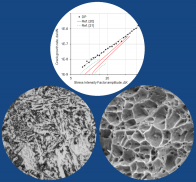METENG - METallurgical ENGineering
Mission
The Institute of Metallurgical Engineering deals with researches on both ferrous alloys (including plain, low alloy, high-alloy and stainless steels, and cast irons) and non-ferrous alloys (including alloys based on aluminum, magnesium, titanium, and zinc), both innovative and traditional, used in the automotive, mechanical, chemical, food, energy, and building sectors. Compositional, microstructural, fractographic, mechanical and electrochemical tests are employed and interpreted on the basis of the principles of physical metallurgy and mechanical metallurgy. Corrosion and protection, wear and damage of metals and alloys are also studied experimentally and theoretically. Studies are performed on metals submitted to bulk heat treatments and to surface hardening treatments, as well as on coatings for corrosion protection or for other functional purposes. Industrial production methods, including casting, hot and cold forming, powder metallurgy, welding and additive manufacturing are also studied. Further lines of study include failure analysis and hydrogen compatibility of metals and alloys.
Main targets
- Microstructural and mechanical properties of steels and other metallic alloys
- Thermal and thermochemical treatments applied to ferrous materials
- Metallurgical effects of welding on steels and aluminum alloys
- Electrochemical behavior of metallic materials
- Compatibility of metallic materials with hydrogen
- Historical manufacturing processes of metallic materials
- Production of lightweight metal components
Main research topics
- Metallurgical analysis of steels, cast irons and aluminum alloys, based on chemical, metallographic, roengtenographic and fractographic analyses.
- Production processes and microstructural and mechanical properties of steels and aluminum alloys.
- Thermal and thermochemical treatments on ferrous materials and aluminum alloys. Traditional and innovative steels. Surface thermochemical treatments.
- Effects of welding of steels (non-alloyed and stainless) and aluminum alloys.
- Fracture mechanics and failure analysis and prevention.
- Electrochemical behavior of metallic materials. Corrosion and protection of plain and alloy steels and of Mg, Al, Ti, Cu, Ni and Co based alloys.
- Compatibility of metallic materials with hydrogen and hydrogen embrittlement phenomena
- Historical manufacturing processes of metallic materials and their microstructural and mechanical effects
- Production of porous metal components, with good shock and/or vibration absorption properties
Main partnerships
- Centro Ricerche FIAT (Torino)
- Punch Torino S.p.A. (Torino)
- Siad Macchine Impianti S.p.A (Bergamo)
- Museo della Armi L. Marzoli (Brescia)
- J-Tech - Laboratorio interdipartimentale sulle giunzioni - Politecnico di Torino
- Endurance S.p.A. (Chivasso, TO)
- Dynacast Italia Torino S.p.A (Grosso, TO)
Projects and publications
-
 Selected recent publications
2023
Selected recent publications
2023-
Corrosion Behaviour of Zr-Ag Alloys for Dental Implant Application
Article
Rosalbino, Francesco; Macciò, Daniele; Scavino, Giorgio
MATERIALS SCIENCES AND APPLICATIONS
Scientific Research Publishing
Vol.14 pp.14 (pp.501-514) ISSN:2153-117X DOI:10.4236/msa.2023.1411033 -
Synthesis and wear behaviour analysis of SiC- and rice husk ash-based aluminium metal matrix composites
Article
Mustafa, Sameen; Haider, Julfikar; Matteis, Paolo; Murtaza, Qasim
JOURNAL OF COMPOSITES SCIENCE
MDPI
Vol.7 pp.15 (pp.1-15) ISSN:2504-477X DOI:10.3390/jcs7090394
-
Co-Casting of Al and Al-Foams
Article
Ferraris, Sara; Santostefano, Antonio; DE MARCO, Frediano; Campagnoli, Elena; Matteis, Paolo; Barbato, Antonio; Molina, Roberto; Ubertalli, Graziano
ADVANCED ENGINEERING MATERIALS
Wiley
pp.13 ISSN:1527-2648 DOI:10.1002/adem.202200116
-
Electrochemical corrosion behavior of LDX 2101® duplex stainless steel in a fluoride‐containing environment
Article
Rosalbino, Francesco; Scavino, Giorgio; Ubertalli, Graziano
MATERIALS AND CORROSION
© 2020 WILEY‐VCH Verlag GmbH & Co. KGaA, Weinheim
Vol.71 pp.8 (pp.2021-2028) ISSN:1521-4176 DOI:10.1002/maco.202011826 -
Al-Based Metal Foams (AMF) as Permanent Cores in Casting: State-of-the-Art and Future Perspectives
Article
Ubertalli, Graziano; Ferraris, Sara
METALS
MDPI
Vol.10 pp.20 ISSN:2075-4701 DOI:10.3390/met10121592 -
Automatic Measurement of Pearlite Spacing by Spectral Analysis
Article
Matteis, Paolo
METALLOGRAPHY, MICROSTRUCTURE, AND ANALYSIS
Springer
pp.7 ISSN:2192-9262 DOI:10.1007/s13632-020-00630-9 -
Welding between aluminum alloy and steel sheets by using transition joints
Article
Matteis, P.; Gullino, A.; D’Aiuto, F.; Puro, C. M.; Scavino, G.
JOURNAL OF MATERIALS ENGINEERING AND PERFORMANCE
Springer
Vol.29 pp.14 (pp.4840-4853) ISSN:1059-9495 DOI:10.1007/s11665-020-04595-2
-
Influence of iodide ions on corrosion of dual‐phase steel in sulfuric acid solution
Article
Rosalbino, F.; Scavino, G.
MATERIALS AND CORROSION
WILEY‐VCH Verlag GmbH & Co. KGaA, Weinheim
Vol.70 pp.8 (pp.2033-2040) ISSN:1521-4176 DOI:10.1002/maco.201910884 -
Mechanical performance of historical wrought iron rods
Article
Matteis, P.; Scavino, G.
ARCHAEOMETRY
Wiley
Vol.61 pp.13 (pp.1053-1065) ISSN:0003-813X DOI:10.1111/arcm.12470 -
Review of Aluminum-To-Steel Welding Technologies for Car-Body Applications
Article
Gullino, Alessio; Matteis, Paolo; D’Aiuto, Fabio
METALS
MDPI
Vol.9 pp.28 ISSN:2075-4701 DOI:10.3390/met9030315
-
Corrosion Behaviour of Zr-Ag Alloys for Dental Implant Application
Reference laboratories
- Electrochemical Measurements Laboratory
- Mechanical testing Laboratory
- Optical Microscopy Laboratory
- Roentgenografy Laboratory
- Thermal treatments Laboratory 1

